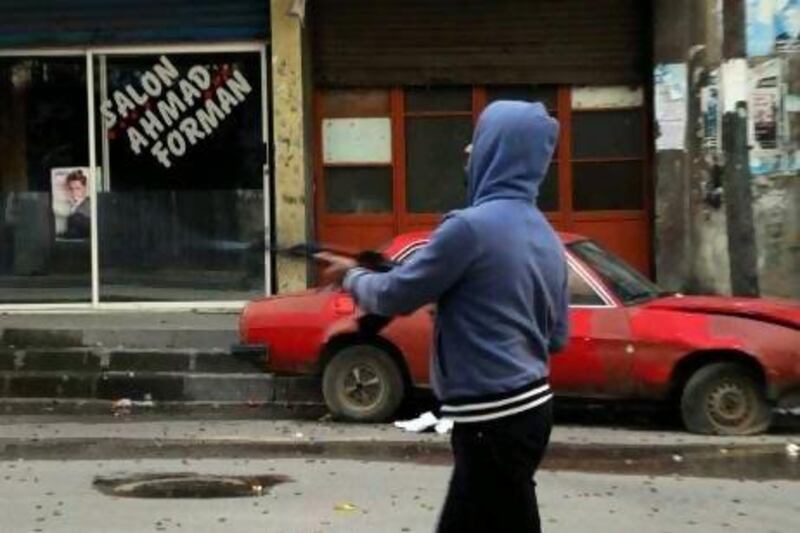UNITED NATIONS // As violence mounted in Syria yesterday with bombardments of civilians and the assassination of a general in the capital, the UN General Assembly prepared to vote on a resolution endorsing an Arab League plan to end the killing.
The League meets today to consider its next step in its campaign to oust the Syrian president, Bashar Al Assad. League member Saudi Arabia has introduced a draft General Assembly resolution of condemnation that echoes one vetoed in the UN Security Council by Russia and China, according to a copy seen by The National.
The main opposition umbrella group, the Syrian National Council (SNC), also said it was confident of Arab recognition and support of the group as the official opposition, although not at today's League meeting in Cairo.
The Syrian army moved on protest centres and the brigadier-general, the head of a military hospital, was gunned down outside his Damascus home, underscoring the government's thin control on the capital, as the bloodshed showed no signs of abating, even spilling over into Lebanon.
The 22-member League, which has suspended Syria and imposed economic sanctions, is looking for fresh ways to intensify pressure on Mr Al Assad.
The draft General Assembly resolution condemns Syrian government human-rights violations, and lists them in detail.
"The use of force against civilians, arbitrary executions, killing and persecution of protesters, human-rights defenders and journalists, arbitrary detention, enforced disappearances, interference with access to medical treatment, torture, sexual violence and ill-treatment, including against children," the document says.
It echoes the League's original peace plan, agreed to by Mr Al Assad just a few months ago, demanding an end to the violence, the release of political prisoners and free access for League monitors.
In Cairo today, the League will consider establishing a joint League-UN observer mission after its original attempt was condemned as an inept.
Failure by the UN's top decision-making body to deliver international condemnation of Mr Al Assad's crackdown on protesters has left his neighbours and their western allies with dwindling options on how to end a conflict the UN estimates has killed more than 5,400 people since it began in March last year. The Syrian government says 2,000 of its forces also have died.
Resolutions passed in the 193-member General Assembly, where every member state has one vote and no vetoes apply, have less standing because they are non-binding.
Only the 15-member Security Council can authorise sanctions or even military action, as happened with Libya.
But strong majority support in the Assembly - a vote is expected on Friday - would further isolate Russia, which has close military ties to Syria.
The UN's human-rights commissioner, Navi Pillay, will brief the Assembly tomorrow.
She wants the Security Council to authorise a war-crimes investigation against Mr Al Assad and other Syrian leaders.
"We believe, and we've said it and we'll keep repeating it, that the case of Syria belongs in the International Criminal Court", the spokesman, Rupert Colville, said in Geneva.
For a seventh day, government forces pounded civilian neighbourhoods in Homs, as video images showed army tanks and troops inside the city. Hundreds of civilians have died since the government launched its attack on the city on the eve of a Russian and Chinese veto of a Security Council resolution that would have asked Mr Al Assad to relinquish power.
The city is running out of food and medical supplies, activists say.
In Syria's second-largest city of Aleppo, tensions escalated as Mr Al Assad's forces stepped up security after twin car bombs killed 28 people and wounded 235 on Friday, activists said.
At least 25 people were killed across the country yesterday, all but six of them civilians, said Rami Abdel Rahman of the UK-based Syrian Observatory for Human Rights.
In Lebanon, two people died and 24 were wounded in fierce clashes in northern Tripoli between Sunnis hostile to Syria's regime and Alawites who support it, a security official said.
Iraq's deputy interior minister said yesterday that jihadists are moving from Iraq to Syria and weapons are being shipped from Iraq to Mr Assad's opponents, who include thousands of soldiers who have defected.
"We have intelligence information that a number of Iraqi jihadists went to Syria," Adnan Al Assadi told AFP, adding that "weapons smuggling is still ongoing" from Iraq to Syria.
The SNC has been meeting in Qatar to discuss its political strategy and winning formal recognition as the opposition leadership.
SNC member Ahmed Ramadan, said yesterday that Arab recognition of the council is imminent, adding there had been strong signals of support from the Gulf Cooperation Council, which includes the UAE.
* Agence France-Presse and Associated Press






